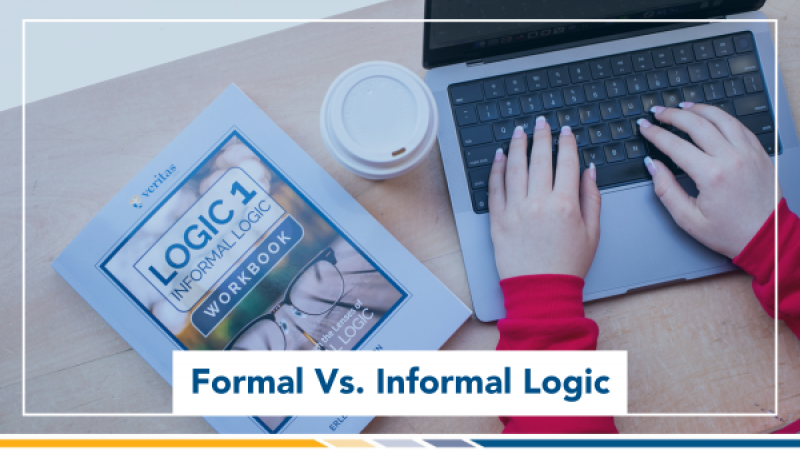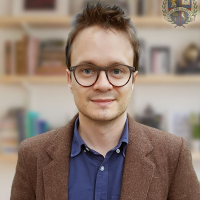What's the Difference Between Formal and Informal Logic?

Transcription
Note: This transcription may vary from the words used in the original episode for better readability.
Hello, I'm Erlend MacGillivray, one of the teachers in Veritas Scholars Academy, and I'm here to talk about logic, both what courses we run in it and what distinguishes the two types of logic that you can study.
So we can divide logic into two. One is informal logic and one is formal logic.
Informal Logic
Starting with informal logic – and this is where if you're taking Logic I Veritas or Logic II Canon Academic Press, this is where you'll be exposed to informal logic.
It's called informal because it deals with everyday arguments, everyday speech, everyday life. So it's particularly focused on things such as fallacies. So these are where you have errors in thinking, popular errors in thinking, such as, to use a popular one, ad hominem abusive. That’s where instead of attacking the issue at hand, you attack the person.
So I might say, or someone might say their policy for the new road system in the town is wrong. How do I know? Well, they've got silly here. Therefore the proposal on the road system is wrong.
So informal fallacies are popular wrong ways of arguing or trying to distract from the issue at hand or hide the issue at hand. And so both Logic I Veritas and Logic Canon Academic Press they will explore fallacies.
Within Logic II Canon Academic Press, you also get into conspiracy theories. So the students will present on conspiracy theories or urban legends and there'll be quite a few debates as well. It also looks at how do you build up arguments in everyday speech that are logically coherent. So how do you go about that? And particularly there you use Aristotle's common topic.
So using things such as analogies and testimonies. And how do you build these up in a logical way, in an inaccurate way. In Logic I Veritas there's not really a focus on conspiracy theory. So we do look at things such as aliens which kind of runs through the course as a way of thinking logically about claims.
but what distinguishes that is that we look at other things such as cognitive biases. So these are ways of thinking that again distract from the truth or prevent us from maybe getting to the truth. So for example confirmation bias – pointing out that we're far more likely to accept a claim if it's something we more readily would agree with.
So we were less questioning of claims that are being made that we agree with and things to do with memory. So if we hear something more often more frequently we're more likely to accept or indeed more recently we're more likely to accept it. So that's the Logic I Veritas and Logic II Canon Academic Press.
If you go down the Veritas route you would study informal logic first, Logic I Veritas informal logic. If you do the Canon Academic Press route that's second. And it usually is the case that students will find informal logic the more easier of the two types of logic.
Formal Logic
Formal logic is very different and usually we'll draw an analogy between it and say a course like algebra where you're getting very precise very concrete rules that you're applying. And you will reach a certainty if you're applying the rules correctly you will know for certain that this is the right answer. Informal logic is about probabilities. Formal logic is about certainties and it works by or in part by taking propositions, and to use an analogy it's almost like sentence diagraming them.
By using these different rules where we go to look really carefully at the propositions that are being made and using what is being built up within deductive logic these tools these rules to see whether we think this is valid or not. So for example to use a not profound argument you might make, all mammals have lungs. A whale is a mammal. Therefore what do we know? A whale will have lungs.
So looking at and this is where you get into things such as syllogisms. We have two premises. Then a conclusion. It's about how do you build up a syllogism? How do you tell if you have one that's invalid or not sound.
And the end result is that you can use tools such as deductive logic. It's not used every day but it's used very much. For example in philosophical arguments. So it's used in technical philosophical arguments for the existence of God for example. So they feel very different courses or very different types of logic.
Associate Logic
I should also mention Associate Logic. So it actually looks at both of these. So it looks it starts the first half is looking at informal logic. And it takes the Canon Academic Press books and then halfway through and again sticking with Canon Academic Press books, it then switches to formal logic. So it looks at it looks at both.
So in that sense, it's quite an intense course. So there's a lot more to say about informal and formal logic. and the various courses but hopefully that's a useful broad overview of the distinctions.







